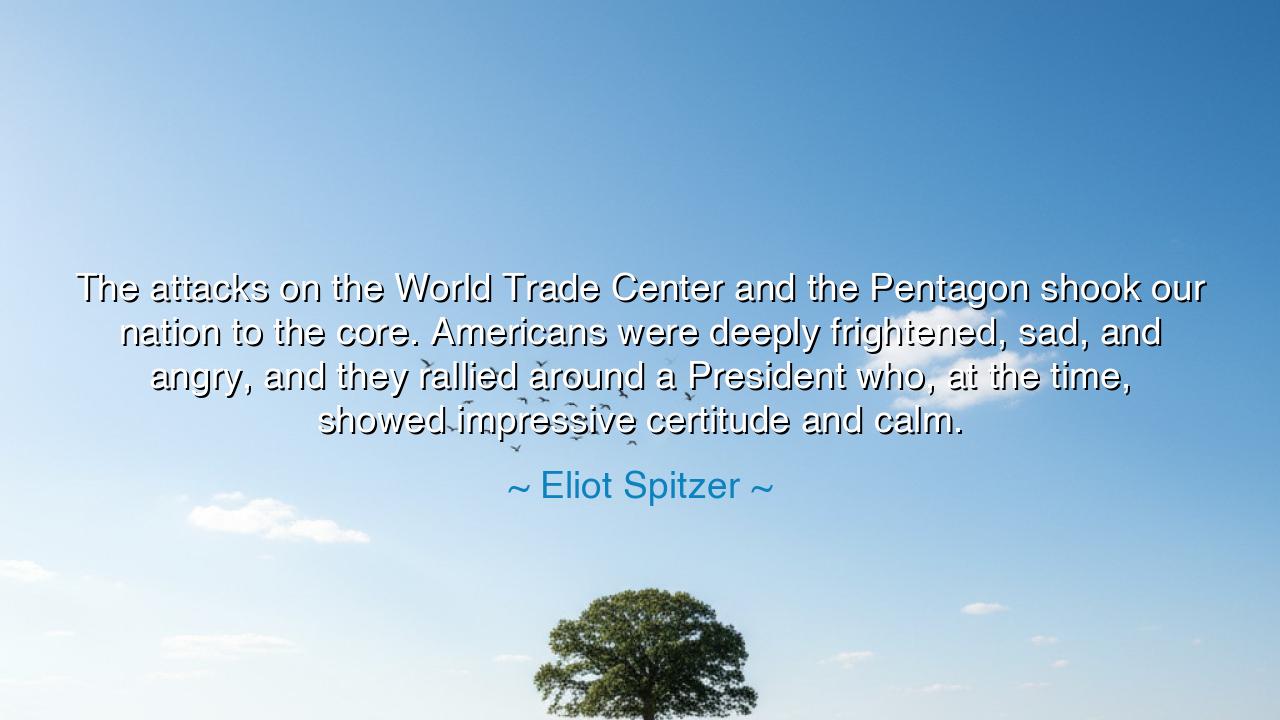
The attacks on the World Trade Center and the Pentagon shook our
The attacks on the World Trade Center and the Pentagon shook our nation to the core. Americans were deeply frightened, sad, and angry, and they rallied around a President who, at the time, showed impressive certitude and calm.






Hear the words of Eliot Spitzer, who bore witness to one of the darkest dawns of our age: “The attacks on the World Trade Center and the Pentagon shook our nation to the core. Americans were deeply frightened, sad, and angry, and they rallied around a President who, at the time, showed impressive certitude and calm.” These are not idle recollections, but the testimony of a people who walked through fire and shadow, and yet stood together. They speak of fear and fury, but also of unity and leadership, of a time when the very ground seemed to tremble, and the soul of a nation was tested.
The attacks of September 11, 2001, were not merely wounds upon buildings of stone and steel; they were wounds upon the heart. The World Trade Center, symbol of commerce and human striving, was brought low in a cloud of dust and sorrow. The Pentagon, fortress of defense and power, was pierced as though to mock its strength. In those moments, the mighty seemed frail, and the secure seemed vulnerable. Yet in that vulnerability, the spirit of a people was kindled, for tragedy has ever been the crucible in which nations are refined.
Consider how the Romans, after the sack of their city by the Gauls in ancient times, rose from humiliation to rebuild with greater strength. What was thought to be their end became instead the beginning of an empire. So too, when the towers fell, the Americans found themselves cast into grief. But grief, when shared, becomes the binding mortar of unity. And so they looked to one another, and to their President, who stood before them not as one untouched by fear, but as one who carried it with courage, masking terror with resolve. His calm became their anchor in the storm.
It is said that a leader’s truest test is not in times of prosperity, but in the hour of despair. In those days after the attacks, when the air was filled with ash and the streets with sorrow, the people sought one voice to steady the trembling multitude. And they found it. Not perfect, not without fault, but a presence of certainty when uncertainty was devouring the soul. This is the essence of Spitzer’s words: that the measure of leadership lies not in the absence of fear, but in the bearing of it with dignity, so that others may borrow strength.
Yet let us also remember the countless unnamed who rose to heroism. The firefighters who charged up stairwells filled with smoke, never to return. The passengers of Flight 93, who, knowing death awaited, wrested their fate from the hands of evil and steered it away from greater slaughter. These deeds proclaim louder than any words that in the face of devastation, the human spirit does not only cower—it resists, it defies, it sacrifices. Thus, while the attacks sought to break a nation, they awakened within it a fierce light that no flame of terror could extinguish.
From this account, we draw a lesson both ancient and enduring: when calamity strikes, the choice lies before us—to be consumed by fear, or to be united in strength. The fall of towers, the shaking of hearts, these are but reminders of life’s fragility. Yet fragility does not mean weakness. A clay vessel, though easily broken, may carry water that sustains a people. So too, in our moments of deepest trembling, we may yet bear the strength to uphold others.
Therefore, let all who hear take this wisdom into their lives. When crisis comes—and it surely will, for no life is spared—be not the first to spread despair, but the first to steady trembling hands. Speak with calm even when your own heart quakes. Offer unity instead of blame, courage instead of withdrawal, and hope instead of surrender. In this way, you become not only a survivor of tragedy, but a torchbearer, guiding others through the night.
Thus the teaching stands: tragedy will come, as it has come to every age. But within it lies the chance to rise, to show that no flame of destruction can burn away the spirit of those who choose courage. For nations and for souls alike, the path through sorrow is always the same: to stand together, unbroken, with hearts aflame not with fear, but with resolve.






AAdministratorAdministrator
Welcome, honored guests. Please leave a comment, we will respond soon